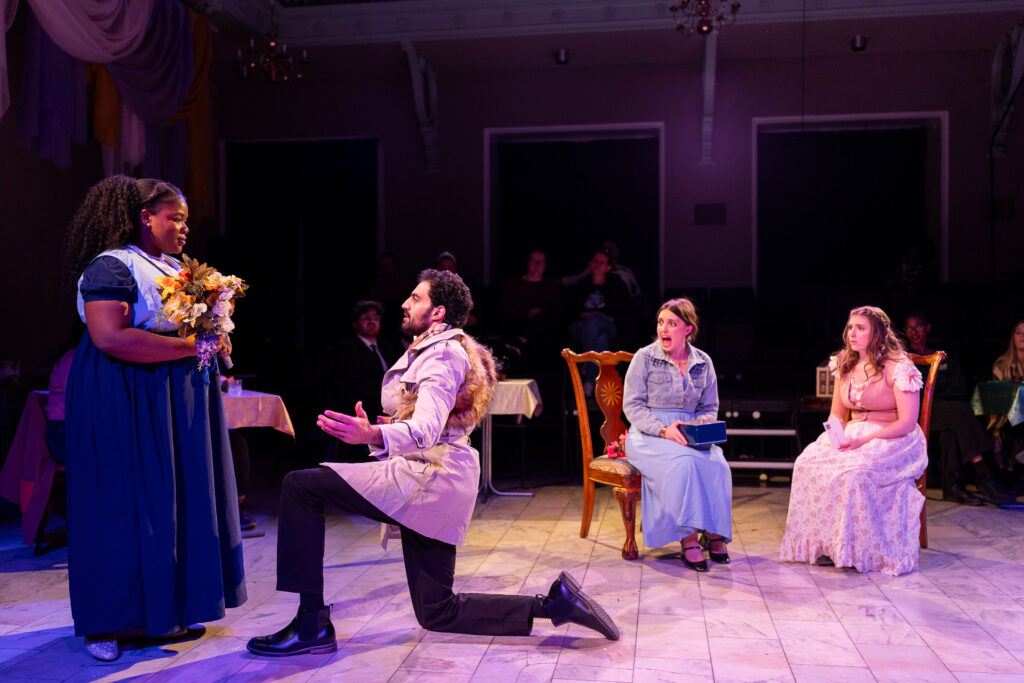
Lorraine Victoria Kanyike, Fady Demian, Josephine Elwood, and Liza Giangrande in Actors’ Shakespeare Project’s production of Emma. Photo by Nile Scott Studios.
Presented by Actors’ Shakespeare Project
Play by Kate Hamill, based on the novel by Jane Austen
Directed by Regine Vital
Scenic design by Saskia Martínez
Costume design by Nia Safarr Banks
Lighting design by Deb Sullivan
Sound design by Anna Drummond
Dramaturgy by Kristin Leahey
Featuring: Alex Bowden, Fady Demian, Josephine Moshiri Elwood, Liza Giangrande, Jennie Israel, Lorraine Victoria Kanyike, Dev Luthra, Mara Sidmore
Tickets and Information Here
November 14 – December 15
The Multicultural Arts Center
41 Second St., Cambridge, MA 02141
Critique by Maegan Bergeron-Clearwood
CAMBRIDGE, Mass. — The Cambridge Multicultural Arts Center theatre is already ornate, bedecked with colorful railings, intricate carvings, and a soaring ceiling. It is a perfect fit for any Regency-era play, but especially for Actors’ Shakespeare Project’s Emma, which is positively dripping with femininity.
Scenic designer Saskia Martínez has draped virtually every surface with soft florals and pastels, cozying up the otherwise cavernous space and inviting audiences (some of whom are seated onstage with the actors – be prepared for audience participation) to settle in for a spot of tea and gossip. Costume designer Nia Safarr Banks paints with the same aesthetic brush: the dresses, stockings, and hats are varyingly anachronistic, with plenty of nods to modern fashion trends, but everything is pulled together with a palette of watercolor blues, pinks, and yellows.
It’s a deceptively unthreatening stage picture, as if director Regine Vital is allowing the audience to not take the play’s characters seriously – only to sweep the rug from under us as Emma and her companions lie, flirt, beg, and make general fools of themselves in this farcical spin on Jane Austen’s novel.
Playwright Kate Hamill is known for her witty, feminist adaptations of classic texts. Her version of Emma is characteristically funny, but it leans so heavily on irreverence and self-awareness that it loses the emotional gravity that the source material is famous for. This adaptation is rife with slapstick, meta-theatrical winks to the audience, and explicit feminist commentary, to such an extreme that a second-act monologue outright explains how societal constraints on Emma’s autonomy are the cause of her misguided behavior.
Jane Austen’s Emma is already a biting deconstruction of the rom-com genre, so Hamill’s additional layers of deconstruction feel condescending and even crass, as if she has little trust in either the source material or the audience.
Despite the adaptation’s flaws, the cast embraces the farcical elements with so much enthusiasm that it’s hard not to enjoy the ride.
Fittingly, the ensemble is carried by its female performers. Josephine Moshiri Elwood and Liza Giangrande are a mesmerizingly in-sync comic duo as the scheming Emma and her gullible companion Harriet respectively, although Mara Sidmore as Mrs. Weston, Emma’s mentor, has the difficult task of having to almost singlehandedly ground the play in any emotional stakes, and she rises to the occasion with passion and poise. And Lorraine Victoria Kanyike shines as Emma’s rival, Jane, for her ability to convey an entire scene’s worth of dialogue in a single withering stare.
The design team manages to transform a deceptively simple set, comprised of impeccably curated furniture, props, and drapery, into an impressive array of locations. Subtle but impactful lighting and sound cues (designed by Deb Sullivan and Anna Drummond respectively) transport us to a sweltering summer’s day, a raucous dance party, a quiet summer night, and so much else in between.
Vital’s direction is snappy and endlessly fun. Virtually every story beat is punctuated by a bit of impeccably timed physical comedy, accompanied by running gags, puns, and innuendos aplenty from Hamill. Emma is quite long for a farce (two-and-a-half hours including a 15-minute intermission) so the staging feels a bit like a juggling act: visual and verbal gags are constantly happening simultaneously, striving to hold the audience’s attention as long as possible in a feat of admirable, but sometimes exhausting, dexterity.
At their best, these modern references and slapstick bits are character-driven and grounded; at their worst, they are distractingly irreverent. Emma and Mr. Knightly dancing to a string quartet cover of a Taylor Swift song (choreography by Taavon Gamble) draws a charming connection between disparate time periods, for instance, whereas a character dabbing moments later threatens to pull audiences out of the moment.
Ultimately, these distinct comedic bits never converge into a cohesive, satisfying character arc, but Vital and her team have done their best with a less-than-cohesive text. While Emma may not tap into the heart-wrenching themes that its source material and other adaptations have managed, it’s frothy and fun – and in these exhausting political times, a bit of silliness may be exactly what some of us need most.
